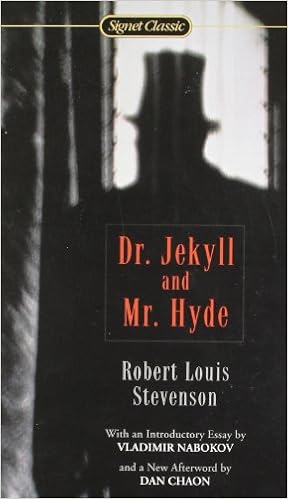For my first book of the year, I read Dr. Jekyll and Mr. Hyde by Robert Louis Stevenson.
Now, I know I just did a review on The Sociopath Next Door, which can be sort of a lot to take in, and Dr. Jekyll and Mr. Hyde isn't exactly the warm and fuzzy book most of us would want to read after reading about sociopaths. But, I literally just grabbed whatever book was next on my bookshelf, and this was it. So, here we go!

The very first time I read this story was at my grandparent's house in Florence, Oregon. At that time, I didn't really understand much of the deeper meaning behind this story. Back then, it was the book that brought about the classic scary story: a scientists who creates some sort of medicine or potion that turns him into a monster. Since Stevenson penned this story, it's become an iconic mystery plot that we all know, even if we haven't ever read the book!
The gist of the story is just as I described: Dr. Jekyll is a respected, honorable doctor in London who creates a concoction of drugs that, when ingested, changes his form and even his very being into an evil man, Mr. Hyde. In essence, Dr. Jekyll created a way for his rather bored self to become submissive to a stronger, younger, and more evil desire within him (Mr. Hyde). Dr. Jekyll is a man with morals and honor. Mr. Hyde has neither, and is full of rage, hatred, and manipulation.
Dr. Jekyll is aware of what Mr. Hyde does when he's 'alive', and the transformation becomes sort of an outlet where Dr. Jekyll can do whatever he wants as Mr. Hyde and get away with it because no one would suspect caring Mr. Jekyll. Eventually, however, Mr. Hyde starts taking over, transforming at will almost, and he is a completely separate person from Dr. Jekyll, only using the doctor's physical frame to keep him alive. At such a point, the doctor exclaims, "I did not even exist!"
As I read this story, I thought of probably one of the most common interpretations of the plot: the Christian view of letting the inner evil within you take over. You see, Dr. Jekyll's experiment was more out of curiosity: could he physically separate the good and evil inside into two different forms? Once Mr. Hyde was born, it became easier for Dr. Jekyll to transform, to give way to Mr. Hyde. However, at one point, Dr. Jekyll had had enough of Mr. Hyde, and he shut the monster away inside for months. During that time, Mr. Hyde grew impatient and antsy, and when the doctor gave way once again, Mr. Hyde sprang forth with greater rage than before. And so he did every time since until the doctor lost all strength to fight against the monster he created.
Such can we be if we give way to the evil and temptations we face within ourselves. Giving way to evil out of curiosity or in a seemingly small and harmless way puts that taste in our mouth, gives a hint of what we can do as a 'different person'. Of course, we're not changing forms like Dr. Jekyll did, but we can in essence become a different person, driven by instincts and desires of the evil instead of the good.
While this is a common and fairly straightforward comparison, I really enjoyed what Dan Chaon discussed in his afterword -- probably because they coincide with what I just read in The Sociopath Next Door. In his afterword, Chaon talks of serial killers, like Jack the Ripper, and how they are a real-life example of a Dr. Jekyll/Mr. Hyde situation. You see, most serial killers don't appear as serial killers. They are usually the friendly, nice guys at work or around the neighborhood (I use guys here just in the example, but I'm not saying that serial killers are only males). That's their Dr. Jekyll mask. Then we find out that they have killed people, and it's almost as if their former identity "did not even exist."
I'm sorry to use a somewhat graphic example; that's the one Chaon gives in his thoughts. But the same could be for just about anyone, not just serial killers. It could happen on even the slightest of ways when we find out someone did or said something that doesn't seem like them- it's as if, in that moment, their Mr. Hyde took over, that they are not the person we thought because they simply acted as someone else.
It's an interesting thought, and I hope this Jekyll/Hyde parallel isn't something we run into on a regular basis with ourselves or those around us. We should certainly be who we are, be the same person no matter what, always living by the same morals, ethics, values, standards, etc. If we live a life of double identity, we are bound to come to the same end that Dr. Jekyll did: where one identity takes over the other, and usually it's the more wicked one that wins. A simple solution to avoid all that: just be you, and be good. :)
No comments:
Post a Comment
Hi there! We appreciate your time! Let's keep things clean & peaceful here. Thanks, guys.